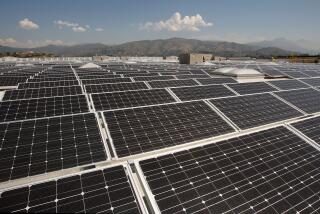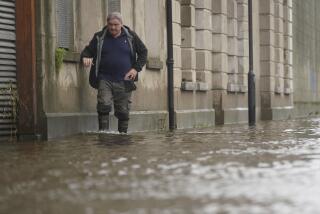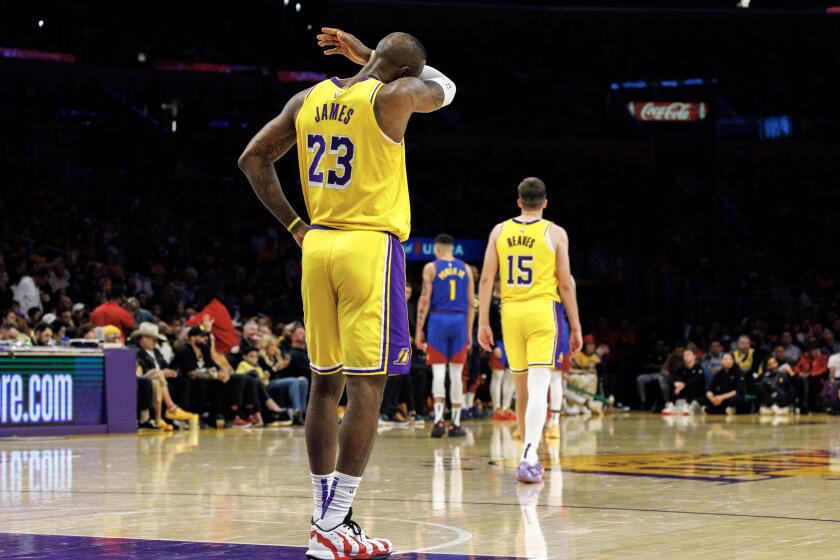American Olympians prepare for the worst in London weather
This summer, Bernard Lagat has the perfect trip in mind. He knows a town in southern Germany where the weather should be just right.
“Cold,” he says. “Even in July.”
Even better, the sky over Tubingen can turn gray and threatening at this time of year.
“When it rains,” Lagat says, “I’ll go to the track.”
Like many Americans headed for the 2012 London Olympics, the veteran distance runner is trying to prepare himself for a gloomy English summer.
Cool temperatures and precipitation could affect a host of outdoor events ranging from archery to triathlon. Even sailing.
“Some mornings there is fog on the water,” said Zach Railey, a Finn class racer. “I’m from Florida, so it’s definitely a big change.”
The last two months have raised fears about what the weather has in store as severe storms and flash floods have plagued the United Kingdom. Downpours soaked the crowds that turned out for Queen Elizabeth II’s diamond jubilee in early June.
Still, forecasters at the Met Office — the national weather service — insist it is too early to predict what weather will be like during the Games, though they do concede that the first week looks rainy.
“The UK is an island nation, and as a result has an island climate which can vary widely both from day to day, week to week and year to year,” John Prior, manager of the National Climate Information Centre, said in a statement.
The Met Office has devoted specialists to an Olympic staff. Among other tasks, they have gathered 30 years’ worth of weather data for each of the competition sites in and around London.
Historically, the city averages temperatures in the low 70s and about 10 days of rain a month at midsummer. Outlying locations, such as Old Trafford soccer stadium in Manchester, can be even cooler and wetter.
That could make for brisk sales at local stores reportedly stocking up on ponchos and umbrellas.
The weather won’t matter to half of the Games’ 36 sports because they are played indoors. No squalls can dampen gymnastics, boxing or basketball.
But hundreds of outdoor athletes will be at the mercy of weather.
American triathletes learned that lesson the hard way during a test event in London last summer, when slick streets caused Olympic hopeful Jarrod Shoemaker to wipe out on his bicycle.
Marathoners will like the cool climate, but other types of runners might need extra time to warm up.
“As a sprinter, 70- to 80-degree weather is ideal,” said Wallace Spearmon, a 200-meter runner. “It’s just something you have to deal with.”
Beach volleyball players, who endured rain in Beijing four years ago, know they must be careful to position themselves directly under slippery shots. They must also modify their eyewear.
“I’m sponsored by Oakley so I have to wear sunglasses when I play,” said Phil Dalhausser, a defending gold medalist. “I’ll just put clear lenses on.”
Other adjustments to the weather require more of an effort. Lagat wasn’t the only one to seek out a colder training spot before the Olympics.
The U.S. sailing team pretty much took up residence in Weymouth — a site for their upcoming competition — this year. They needed time to acclimate to frequent showers.
“It’s a little more difficult with visibility and being able to see what’s going on with the wind,” Railey said.
Track-and-field athletes got a sneak preview during their trials in Eugene, Ore., where rain fell sporadically on Hayward Field.
“We don’t get weather like this in San Diego,” jumper Will Claye said. “But seeing everyone compete and compete good … makes me think I can do anything.”
The British certainly aren’t concerned.
They shrugged it off when rain fell on Athens the day the torch began its long journey to London. And the opening ceremony will reportedly include a synthetic cloud dumping drizzle on the stadium to ensure a suitably English ambience.
Lagat needs to adopt that kind of nonchalant attitude. That’s why he is spending time in Germany, waiting for the clouds to let loose.
But for him and other American athletes, dealing with the weather might not be easy.
“That’s my weakness — I can’t run in the rain,” Lagat said. “I don’t like it.”
twitter.com/LATimesWharton
More to Read
Get our high school sports newsletter
Prep Rally is devoted to the SoCal high school sports experience, bringing you scores, stories and a behind-the-scenes look at what makes prep sports so popular.
You may occasionally receive promotional content from the Los Angeles Times.







